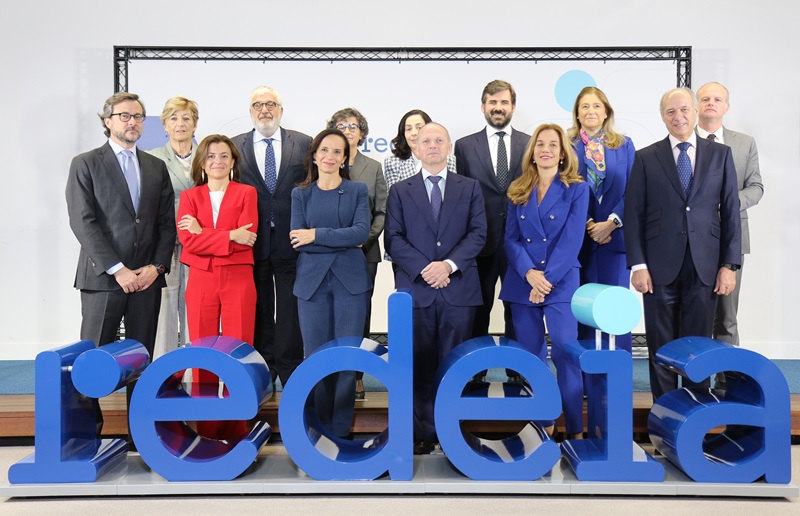We are a global operator of essential infrastructure
- The results were presented today by the Regional Ministry of the Environment and Territory, IMEDEA and Red Eléctrica
- The Marine Forest is a pioneering innovation project that Red Eléctrica started in 2018 to recover two hectares of degraded Posidonia seagrass meadows in Punta de l'Avançada, in the Bay of Pollensa (Majorca)
Red Eléctrica's Marine Forest shows a confirmed survival rate of the planting of Posidonia oceanica fragments started two years ago in the Bay of Pollensa. Today, after having completed the planting works, the first global evaluation of this project aimed at recovering the Posidonia seagrass meadows in Majorca has revealed a survival rate of over 90%.
The data obtained from this first follow-up study were presented today by Miquel Mir, Regional Minister of the Environment and Territory for the Balearic Islands; Eduardo Maynau, Red Eléctrica's Regional Delegate in the Balearic Islands; Jorge Terrados, the researcher from the Mediterranean Institute for Advanced Studies (IMEDEA) and Carlos Pérez Salguero, colonel in command of the Pollensa Military Air Base, whose facilities were made available for the execution of this initiative.
Red Eléctrica's Marine Forest is a pioneering innovation project at world level that the Company started in 2018 in collaboration with IMEDEA, the Regional Ministry of the Environment and Territory and the Pollensa Military Air Base for the recovery of two hectares of degraded Posidonia seagrass meadows in Punta de l'Avançada, in the Bay of Pollensa (Majorca).
With a budget of half a million euros, this initiative has consisted of the planting of 12,800 Posidonia fragments using an innovative technique that includes the phases of collecting plant fragments of Posidonia obtained from natural fragmentation due to marine dynamics, the care and preparation of the fragments to be planted, the planting carried out by divers by anchoring each rhizome fragment to the sea bed and, finally, the subsequent monitoring and follow-up phases.
This is the first planting of an underwater forest of this size in the Mediterranean, and represents a firm commitment of the Company to ensure the recovery and conservation of a species of vital importance in the preservation of Mediterranean marine ecosystems and in the fight against climate change, as Posidonia seagrass meadows are considered as organic carbon sinks due to their capacity to sequester and store CO2.
High survival and rooting rates of planted fragments
The data obtained from the overall assessment conducted is extremely positive. Firstly, the high survival rate, over 90%, which extends to all the units planted on the area to be restored and which confirms that the majority of the rhizome fragments planted have taken root.
Despite the fact that some of the fragments experienced a ‘morphological simplification’, i.e., a loss of a portion of their leaves as part of the adaptation process to the new conditions, the rhizome shoots generally have an optimum root system after planting, favoured by the individual anchoring procedure, which has clearly contributed to the way in which they have developed a strong root system. "The excellent results in terms of survival rates obtained to date indicate that both the choice of location and the technique used have been correct", says Jorge Terrados, a researcher at IMEDEA, and proof of this is that the planted area survived undamaged after Storm Gloria last January, which did affect the Posidonia oceanica seagrass meadows in the north and east of the island of Majorca.
Long-term monitoring
The project monitoring and follow-up will extend beyond the completion of the planting works. Eduardo Maynau, Red Eléctrica's Regional Delegate in the Balearic Islands, highlighted that "Red Eléctrica wants to give continuity to the project, both in terms of the actions taken at the planting site and in everything related to the dissemination of information of a scientific, environmental and educational nature" and added that "the survival and growth of the plants will continue to be evaluated, as well as the recovery of the marine ecosystem associated with the restored Posidonia seagrass meadow. Periodic evaluations are planned over the next few years and then the monitoring actions will be spaced out in accordance with the slow growth rate of the species. This continuity is also guaranteed in all that related to carrying out maintenance actions the logistics of the planted area or the replacement of materials used in the planted area."
For his part, the Regional Minister, Miquel Mir, thanked the participants for the enormous effort involved in carrying out the project which, he said, "confirms, along with other initiatives of the regional government of the Islands such as the Posidonia surveillance and protection service, that the Balearic Islands are a world-wide reference in terms of Posidonia conservation."
Carlos Pérez Salguero, colonel in command of the Pollensa Military Air Base, finally highlighted "the total and continuous collaboration and commitment of the Air Force, represented by the Pollensa Military Air Base, to caring for the environment in the Balearic Islands and in the rest of Spain".
A living laboratory
The objective of Red Eléctrica's Marine Forest is also to become a living laboratory open to the scientific community. Thus, the standardisation of the procedure used, which includes monitoring techniques, traceability codes and the dividing up of the restored surface into quadrants, has become a benchmark to be replicated in the case of other species.
Similarly, the participation of students from the University of the Balearic Islands and other universities in various activities and evaluations related to the project opens the way to associated studies on the evolution of the epifauna, the physiology of the planted areas or on nutrient uptake.
The project for the recovery and conservation of Posidonia seagrass meadows also reaches the field of environmental education, as shown by the programme ‘La Posidònia a l'Aula’ (Posidonia in the classroom), developed by IMEDEA, which is present in primary and secondary schools in Majorca.
Red Eléctrica's Marine Forest forms part of its 2030 Sustainability Commitment, which aims to conserve biodiversity, to fight against climate change and to contribute to social development. The project, which has received numerous awards and acknowledgements, is also aligned with the principles of the ‘Decade on Ecosystem Restoration’, promoted by the United Nations for the period 2021-2030 and which aims to recover degraded natural areas as part of the strategy against global warming and the defence of biodiversity.












